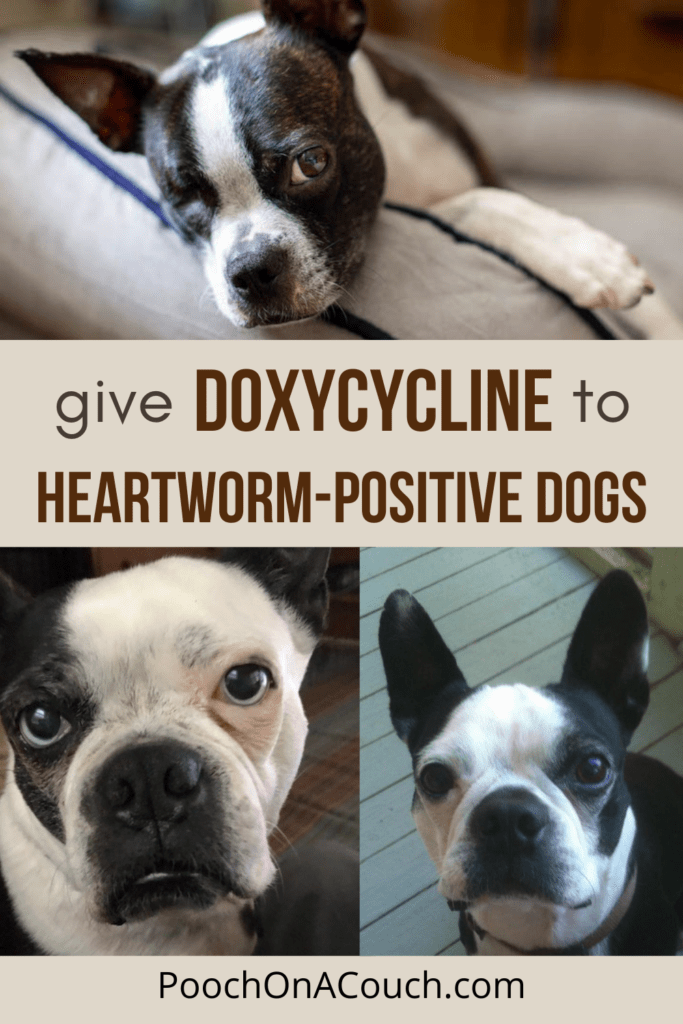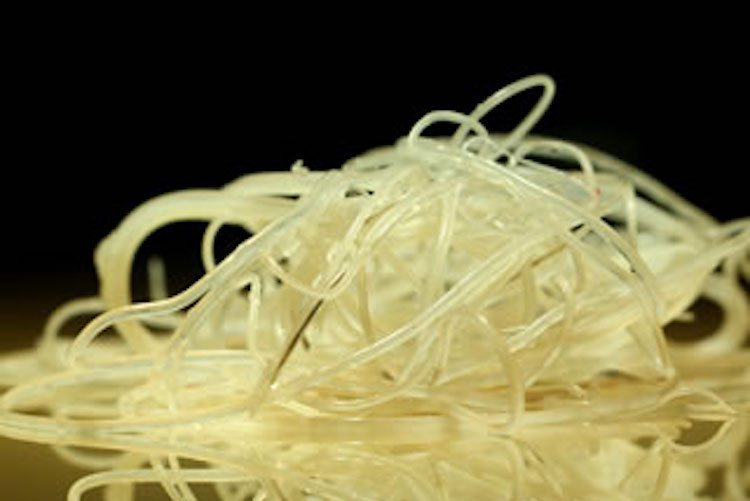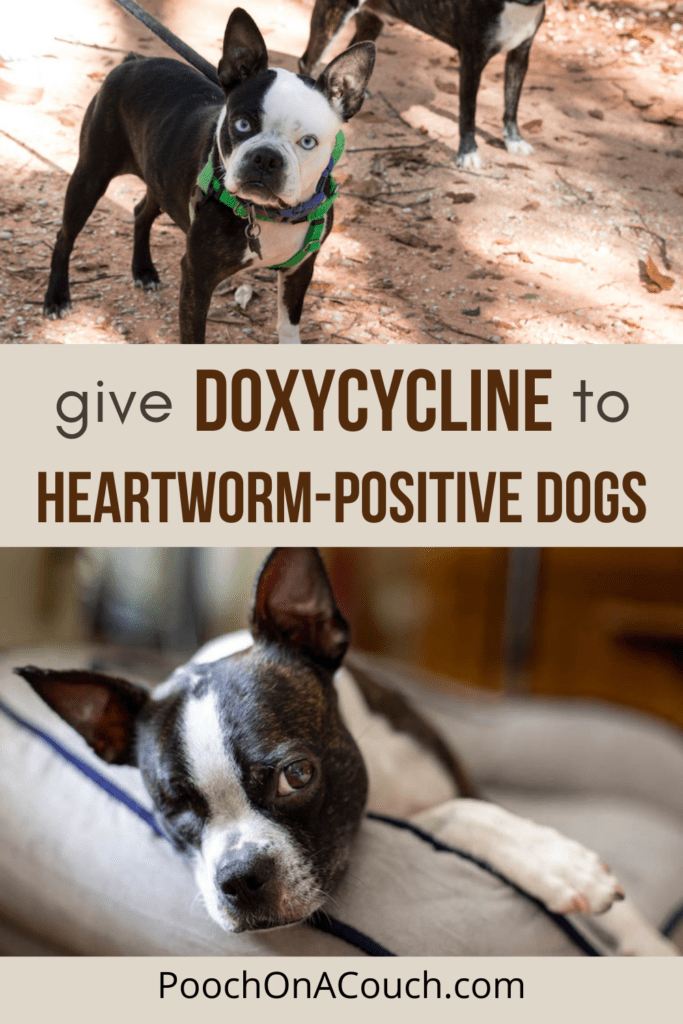Updated 2/15/21
While I am familiar with giving Doxycycline to heartworm-positive dogs, I really didn’t understand why Doxycycline is used for heartworm treatment. Boy, have I learned a lot! I’m excited to tell you about it.
Fact? Major discoveries concerning heartworm and the efficacy of Doxycycline on heartworm disease is a GAME CHANGER.
Based on my understanding, vets should almost always give Doxycycline to heartworm-positive dogs. Keep reading, I’ll tell you all about it!
I am not a veterinarian nor an animal behaviorist. I present my understanding of health or behavior issues based on personal experience and research I’ve done. If you have a dog with a health or behavioral issue, seek professional guidance. I hope you find my post useful.
A Message To Dog Rescuers About Slow-Kill vs Fast-Kill Heartworm Treatments
Dog rescuers are an opinionated bunch when it comes to heartworm treatment protocols.
I’ve been a participant in quite a few “discussions” with dog rescuers on approaches to heartworm treatment. I’m often misunderstood and later, misquoted.
Maybe I’m an ineffective communicator or maybe the mere mention of “slow kill” and “fast kill” protocols polarizes the conversation, and true communication ceases.
But my truth?
I believe fast-kill and slow-kill protocols both have a place in the veterinary care and treatment of heartworm-positive dogs.
I also believe that every rescue agency or independent rescuer should be well-informed about heartworm disease and treatment if you are going to rescue heartworm-positive dogs. And you ARE going to encounter a heartworm-positive dog.
Your veterinarian is your best guide. Me? I’m only an opinionated dog rescuer. (insert wink emoji)
Your knowledge of heartworm disease and treatments should influence your protocols and placement decisions with future adopters. I’ll discuss my ideas further down.
Bottom line, no one wants a dog infected with heartworm to have complications of any type. While tissue damage is of great concern in heartworm-positive dogs, advances in veterinary science have given us a way to minimize consequences and help dogs feel better while shedding adult heartworm.
I don’t know how you can argue with that!
[In this writing, slow-kill heartworm treatment is defined as the use of a macrocyclic lactone every 30 days until a dog is considered heartworm negative.]
I’m sharing some research with you in hopes that I can maybe influence a more standardized approach in caring for the heartworm-positive dog in your agency.
The fact is: independent of which protocol is chosen, heartworm is difficult to treat, risky to treat, and costly to treat either in terms of monetary cost, or cost to the health of the dog.
After you read this AND chat with your veterinarian, I hope you’ll agree: it is smart to give Doxycycline to heartworm-positive dogs as part of their heartworm treatment plan.
“The myth that the “slow-kill” method is “just as good” as melarsomine [fast kill] therapy may have originated in McCall and colleagues’ 2001 study. This study demonstrated that 30 months of ivermectin at preventive doses reduced 7-month old worms by 94% and 8-month-old worms by 56%. However, the older the worms are at the start of “slow kill” therapy, the less efficacious the therapy is in the patient.” (emphasis mine)
Martha Smith-Blackmore, DVM – American Heartworm Society
Doxycycline For Heartworm Treatment
Doxycycline for heartworm treatment has been the focus of a handful of good scientific studies in recent years. Before we look at the benefits of Doxycycline, let’s look at the problems heartworms cause.
Heartworms Cause Problems
Alive or dead, heartworm causes problems in our dogs. Giving Doxycycline to heartworm positive dogs can minimize problems.
In fast-kill heartworm treatment, we have some control over the worm die-off. Actually, we almost know which days heartworm will die during fast kill treatment.
In Slow-kill heartworm treatment, we don’t have any control over when each adult heartworm reaches the end of their lifespan, it could be any hour of any day.
In both slow-kill and fast-kill protocols, the dead worm fragments lodge in lung vessel walls, causing inflammation and tiny pulmonary thromboembolism (blood clots.) These clots damage lung tissue, causing discomfort and can cause death. (<— Read Why Heartworm Positive Dogs Should Not Exercise. )
Veterinary scientists and practitioners very much want to understand these complications and find ways to reduce their severity and occurrence.
Enter Doxycycline. But first…..
Wolbachia – A Problem For Heartworm-Positive Dogs
Wol-what? What’s Wolbachia?
Wolbachia is a common bacteria infecting heartworm, a nematode. It was discovered in heartworm in the mid-1990’s. [1]
While Wolbachia live inside the heartworm, it is not a true parasite, but instead, has a symbiotic relationship with heartworm. Wolbachia needs heartworm to survive and heartworm needs Wolbachia to reproduce.
Female heartworms pass the Wolbachia bacteria to their offspring, and Wolbachia is present in all heartworm life stages, including microfilaria. [3]
It is believed that each and every heartworm carries Wolbachia.
By killing Wolbachia, veterinarians decrease the worm biomass, as well as the inflammatory response to the death of those worms.
Wallace Graham, DVM
Wow. We can make heartworm smaller in size when we kill off the Wolbachia bacteria!
Why We Want To Get Rid of Wolbachia in Heartworm.
Wolbachia contributes to heartworm presence and treatment in three ways:
- Wolbachia aid in the reproduction of heartworm,
thus making the female worms particularly large in size. One speaker (I’ll have to find the source and update this post) described female heartworm as “one big uterus” full of embryos. She is about twice the size of the male heartworm. [2]
Large worms, when they die, cause more problems than small worms. Makes sense, right!? - Wolbachia causes inflammation.
When a heartworm dies, either by natural causes or by melarsomine therapy, Wolbachia bacteria and its components are released into the bloodstream. Wolbachia’s surface proteins also enter the bloodstream. These proteins recruit the body’s immune cells and set off a chain reaction of inflammation in the body. [3] - In slow-kill treatments, there is a more chronic inflammatory process.
The longer Wolbachia remains in the body, (slowly released through slow-kill treatment) the more chronic the inflammatory response.
Chronic inflammation causes its own set of problems for the dog. When a lot of Wolbachia is released all at the same time, (fast-kill) dogs experience a spike in the inflammatory process which predisposes the dog to complications from pulmonary thromboembolism. This may be why many veterinarians are now including predisone as part of first-tier treatment for heartworm. - Wolbachia aid in the development of heartworm larvae
Wolbachia aid in the development of heartworm larvae from the microfilaria stage to the infective stage. In other words, a dog becomes infected with heartworm in part due to the Wolbachia organism.
Doxycycline, Wolbachia, Heartworm.
Kill the Wolbachia BEFORE killing the adult heartworm.
If Wolbachia is killed off first, two things happen:
- reduces Wolbachia surface proteins released into the bloodstream, thereby decreasing the inflammatory response.
- reduces the size of the heartworm. This decreases the severity of PTEs (pulmonary thromboembolism) associated with worm death.
Less inflammation and smaller heartworm.
I like the sound of that.
Additionally, there is evidence that when Wolbachia is no longer present in the canine host, the heartworm microfilaria picked up by the mosquito don’t become infective larvae. They continue to molt into the next larval stage, but they cease to transmit the disease. Using Doxycycline to kill Wolbachia can help reduce the transmission of the disease. [3]
Doxycycline administered at 10 mg/kg twice daily (BID) for 4 weeks has been shown to reduce or eliminate the Wolbachia organisms for up to 12 months.
McCall, et al
In a study done by McCall, et al, Dogs treated with 30 days of Doxycycline showed a gradual death of microfilaria and killed or had an impact on developing larvae.
Microfilariae in blood collected from dogs up to 25 days after the last dose of Doxycycline developed to infective L3, were normal in appearance but did not develop further into adult heartworm after infecting another dog.
Doxycycline kills microfilaria and has an impact on developing larvae and subsequently, the further transmission of heartworm!
Doxycycline plus a macrocyclic lactone (heartworm preventive) is a two-pronged approach to killing microfilaria. In other words, both work independently to kill microfilaria, but together, they provided a better outcome.
Doxycycline reduces worm biomass
Worms (especially the female worms) become smaller with the administration of Doxycycline. Smaller worms and worm fragments, when dead, are less problematic.
What Does Doxycycline Do To Heartworms?
“We put the dog on Doxycycline because the antibiotic helps to render any circulating microfilaria noninfective. It makes the adult heartworms easier to kill, and it reduces the post-treatment side effects from the dying worms in the pulmonary arteries”
Wallace Graham, DVM [4]
Doxycycline and the eradication of Wolbachia early in the treatment (or pre-treatment) of heartworm significantly reduces complications from dying worms, significantly impacting the dog’s response to fast-kill protocols.
For those of you who embrace the slow-kill protocol, Doxycycline seems to shorten the length of time a dog, given the slow-kill approach, tests antigen-negative from 30 months down to 12-14 months. Exercise restriction is still required to minimize lung damage and the development of heart disease.
Click for more information on the slow-kill protocol. This is a 20-minute video, and well worth your time. I strongly encourage you to find time to watch it.
Implications for Rescue Agencies and Independents
I believe many rescue agencies and rescue independents don’t – or can’t – provide melarsomine therapy for dogs in their care.
- it’s expensive
- it’s time consuming (in rescue world, 4 months is a long time)
- it requires skilled foster care
- it’s scary
I also believe that all rescue agencies and independents should figure out how to provide their heartworm-positive dogs with an effective course of Doxycycline therapy prior to adoption, as directed by their veterinarian.
I don’t know how you can dismiss the literature – it’s pretty overwhelming and compelling evidence.
Many of your dogs may already be prescribed Doxycycline for upper respiratory infections as they come out of shelter settings.
Chat with your veterinarian if this is the case for your heartworm-positive dog, and see what adjustments you can make to dosing so that you can give doxycycline to your heartworm-positive dogs.
A Dog-Centered Approach is Always Good Medicine
If you still cannot provide your heartworm-positive dog with Doxycycline and furthermore, melarsomine, I urge you to explore options whereby this dog can get the care they need. Consider:
- transferring the dog to an agency who can/will provide heartworm treatment (especially if you have a dog that is symptomatic for the disease)
- restricting adoption of that dog to a family that has the financial means and intent to provide appropriate treatment to this dog
- seek financial assistance through multiple sources of funds for the health restoration of rescued pets.
Finally, don’t sugar-coat heartworm infection. It isn’t safe and it isn’t easy, no matter how you talk about it.
In order for a dog to recover from heartworm, the worms have to die. Period.
The safer and quicker you do that, the better the dog feels, and we hope, the longer the dog lives. Doxycycline plays a huge role in the safe and effective treatment for heartworm.
Further Research Is In The Works
It’s exciting to see the research that is being done for heartworm.
Science is slow. It just is. And, there is a difference in science that’s done in the laboratory and replicating those findings into the field.
In many ways, the veterinarian community is now field-testing the science. Their clinic results may be influenced by many factors, including highly endemic areas where heartworm resistance is present.
Work is being done to look at alternative treatment protocols when melarsomine treatment is contraindicated.
Protocols like the moxi-doxi protocol look promising in the laboratory, but depending upon variables, isn’t always transferring to the field. I know of a few dogs who’ve failed the moxi-doxi protocol.
Work is also being done to look at testing. One issue is this: clinicians are finding some dogs on slow-kill protocols are testing antigen-negative but are still heartworm positive. That’s a big problem! Think about that as you pick your protocol for your heartworm-positive dog. I’ll be doing some reading and writing on this topic in the future.

References
- McCall, et.al. 2014. Effects of Doxycycline on Heartworm Embryogenesis, Transmission, Circulating Microfilaria and Adult Worms in Microfilaremic Dogs. www.sciencedirect.com
- Blagburn, Byron L MS Ph.D. 2003. Important Heartworm Basics For The Practicing Veterinarian. www.veterinarynews.dvm360.com
- Moorhead, A. AHS Heartworm Hotline Wolbachia, and Heartworm: Why Doxycycline is Needed in Heartworm Treatment. todaysveterinarypractice.com
- Rosenthal, M. 2013. Not The Heartworms You Used To Know. www.veterinarypracticenews.com
Further Reading on Heartworm, Doxycycline, And Wolbachia
Wolbachia and Heartworm: Why Doxycycline Is Needed in Heartworm Treatment
Not The Heartworms You Used To Know
Doxycycline in the Management of Heartworm Disease
Prevention, Diagnosis, and Management of Heartworm Infection in Dogs
Other Health Articles
Caval Syndrome: Hank Beat The Odds
Why Heartworm Positive Dogs Should Not Exercise





